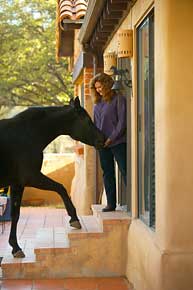Home
Welcome To The Power Of The Herd

Psychologists have shown that only about ten percent of human communication is verbal. Somewhere around ninety percent of the messages we send back and forth to each other are nonverbal. And yet in our culture, we are increasingly mesmerized by words, conditioned over time to ignore that crucial “other 90 percent,” leading to a self-imposed de-evolution of human intelligence if left unchecked over time.
“Leadership presence” is primarily a non-verbal phenomenon, yet where do we go to exercise that “other 90 percent?” History shows that horses are experts at helping people develop the power, focus, balance-in-motion, emotional intelligence, social intelligence, and the physical/mental/emotional collection demanded of great leaders.
Alexander the Great, the Buddha, George Washington, Andrew Jackson, Winston Churchill, and Ronald Reagan are examples of influential, charismatic leaders who developed significant nonverbal acuity and influence through extensive time spent in the saddle. They were all dedicated, in some cases exceptional, horsemen. Yet they also stand out because they were able to transfer some of these skills to human settings.
Read More About The Power Of Consensual Leadership
- As Easy As Falling Off A Horse
- The Tragedy Of Unresolved Feelings
- Words Are Just The Tip Of The Iceberg
- Ignore Emotional Intelligence At Your Peril
The horse, as an individual, is a powerful animal able, in partnership with human beings, to transcend its own flight or fight instincts, showing exceptional courage in war, in exploration, and in adapting to a wide variety of eco-systems. Openness to learning from horses, rather than dominating, abusing and discarding them like objects, helps people reconnect with a different form of power.
Horse herds exemplify collective non-predatory power in action. They are adept at negotiating individual and group needs simultaneously. And they are living examples of the evolutionary advantage of mutual aid over competition. Predators, even groups of predators like wolf packs, rarely attack herds of adult horses as they are incredibly dangerous when they join forces to protect themselves. And yet, horses do not “go for the throat” or enact revenge. And contrary to popular belief, they do not live in fear. They demonstrate high levels of emotional agility, going “back to grazing” after eluding or fighting predators, spending the largest portion of each day in a state of relaxed awareness, gentle exploration, joyful play, deep peace, and profound connection.
The Power of the Herd is ultimately concerned with social evolution, the long, slow process of moving from a predatory dominance-submission paradigm (one that employs fear, intimidation, trauma, and disempowerment to nourish the few at the expense of the many) to independence (an initially invigorating yet problematic, adolescent stage of development) to empowered interdependence where groups of people learn how collaborate effectively and considerately. The latter stage draws on the “power of the herd,” the ability of an authentic community to negotiate and support individual and group needs simultaneously, boosting inspiration, innovation, and connection, continually adjusting to challenging circumstances while fostering an adaptable yet joyful, balanced, sustainable lifestyle.
